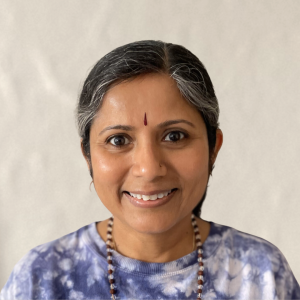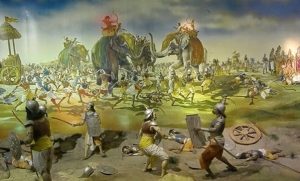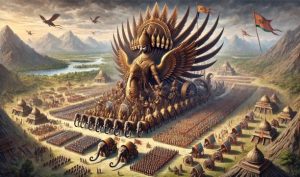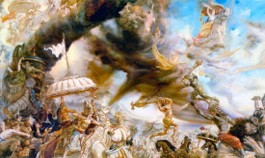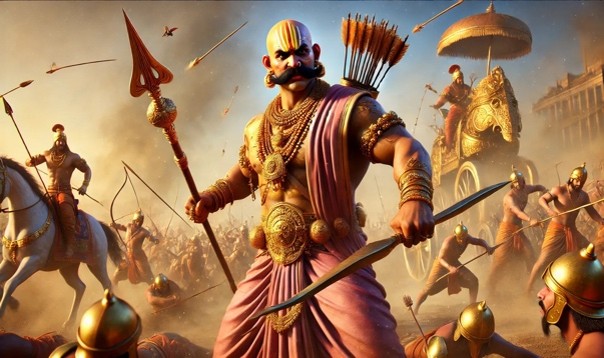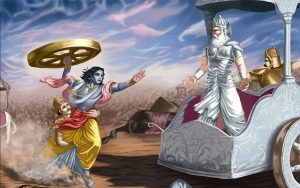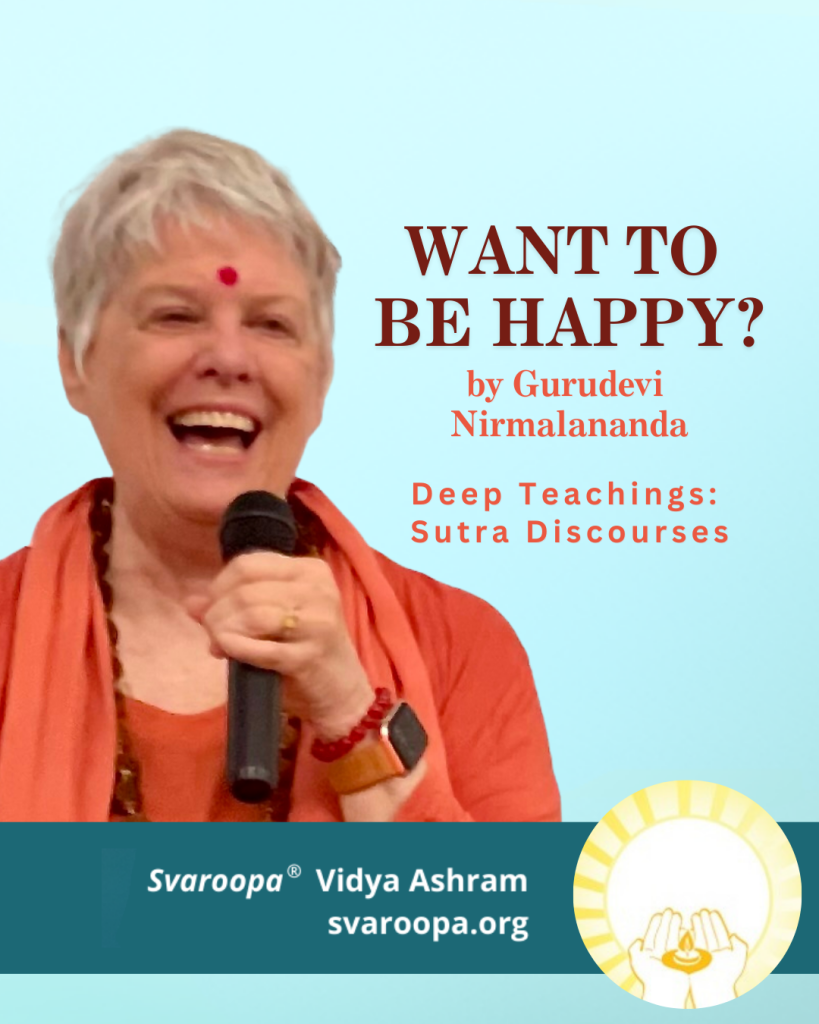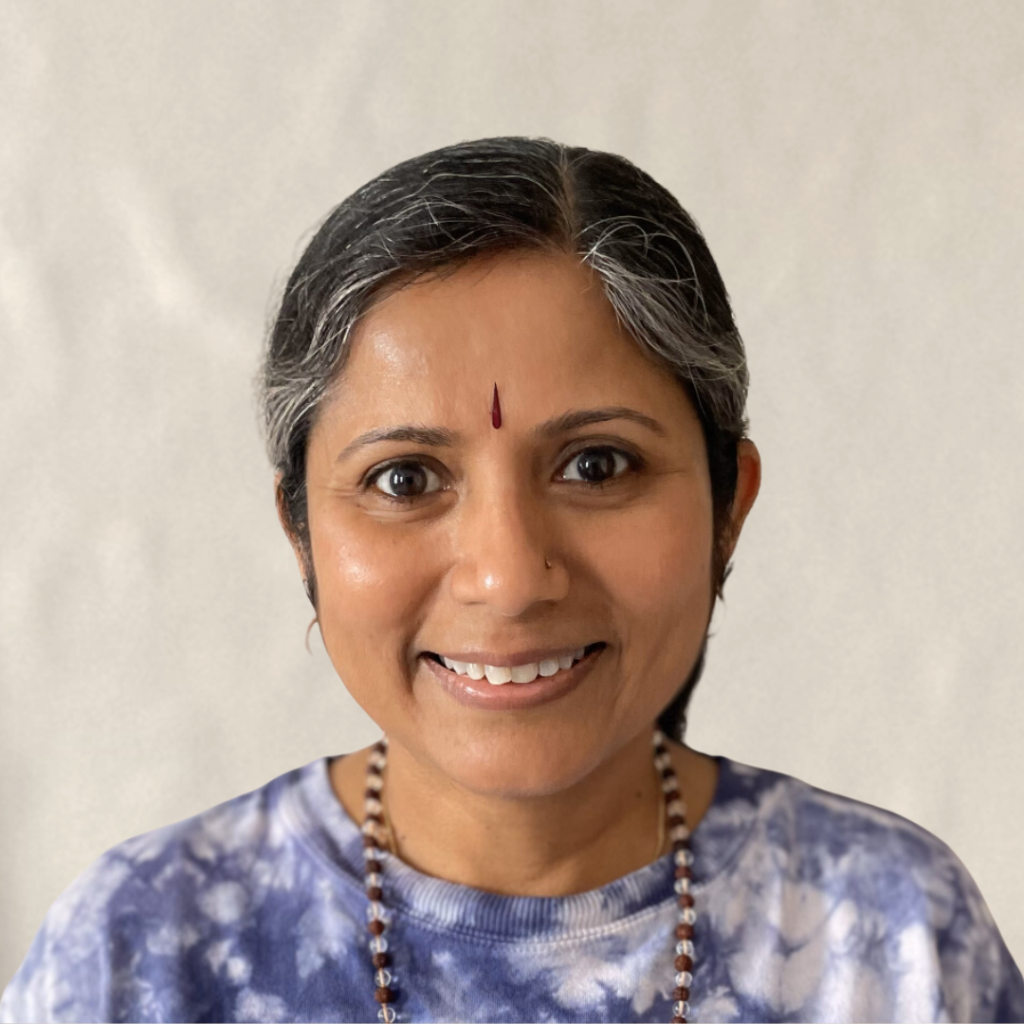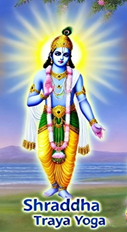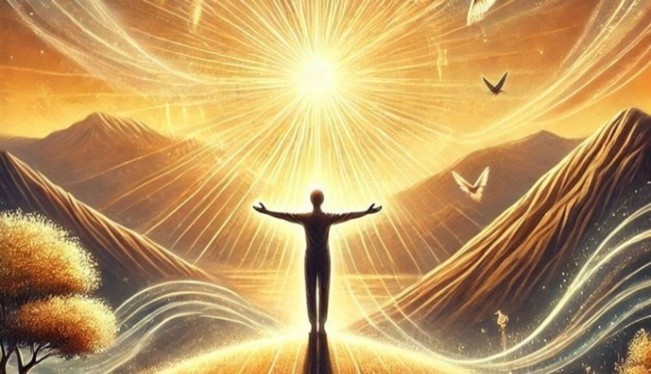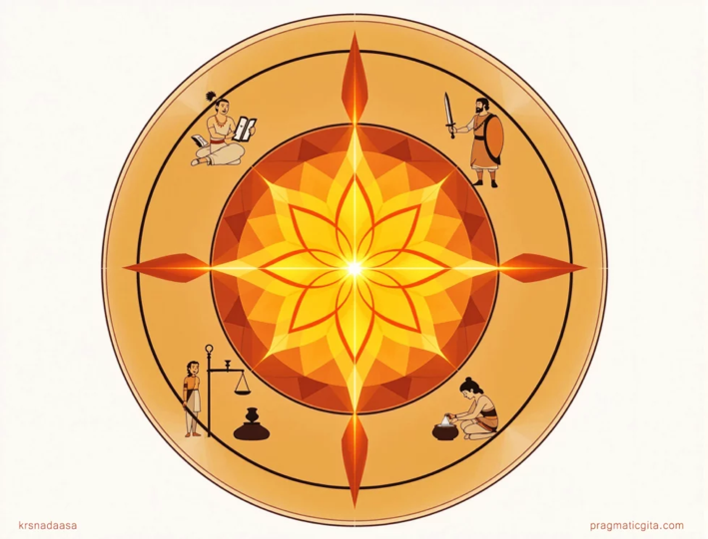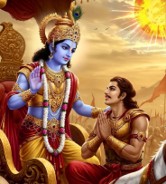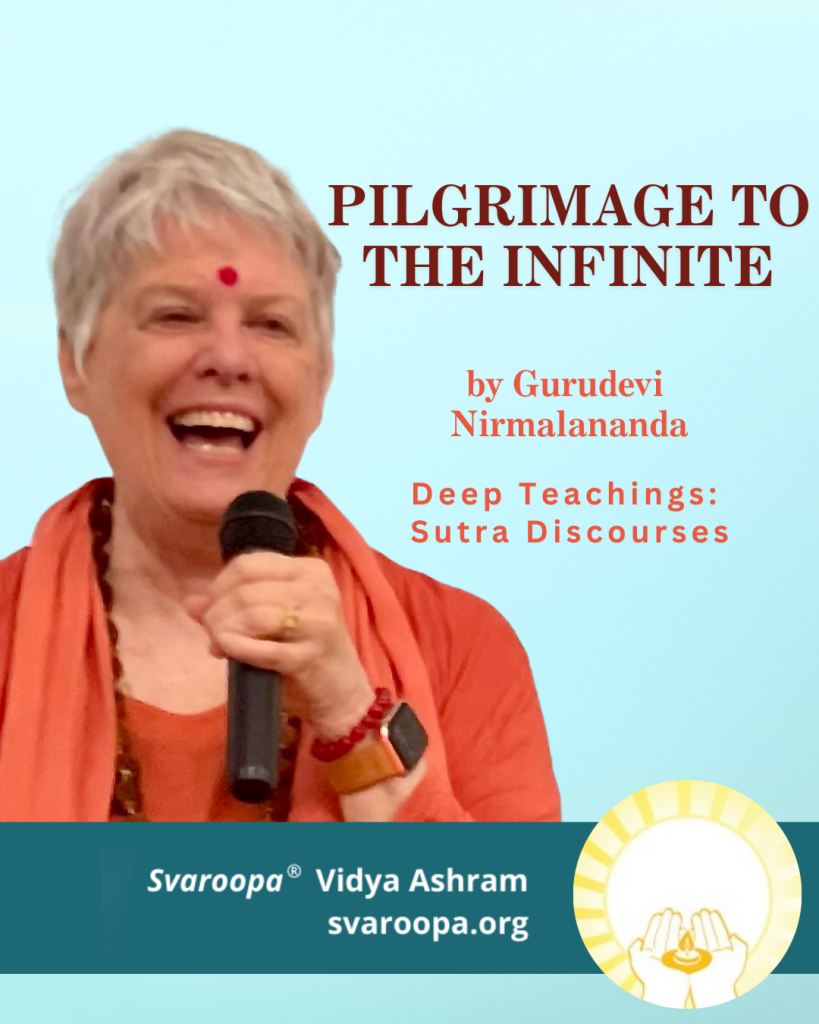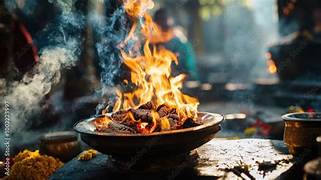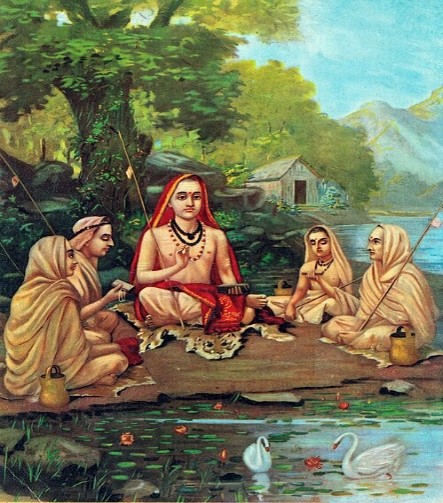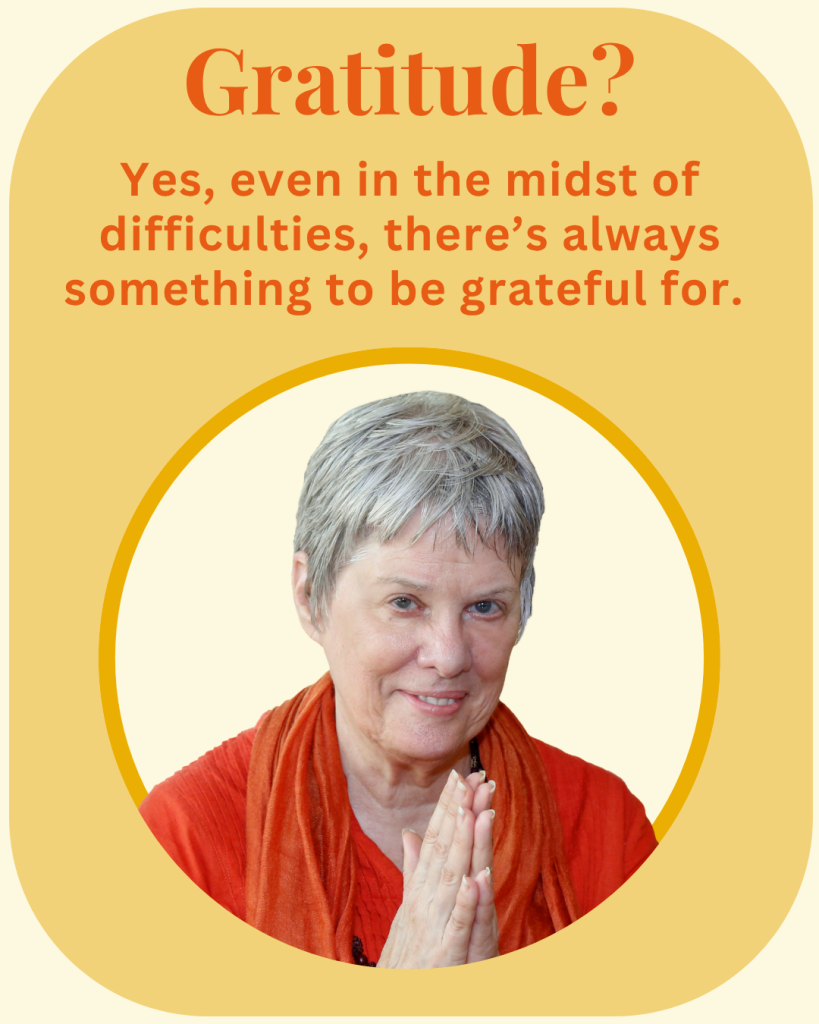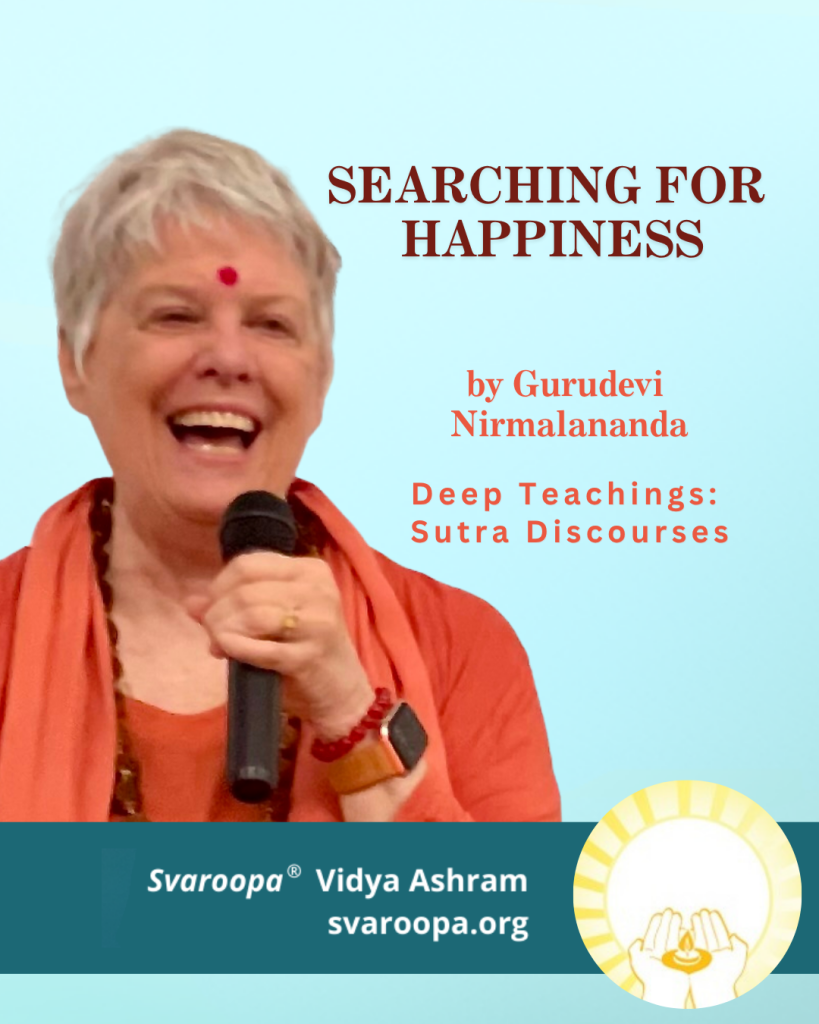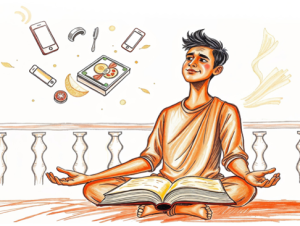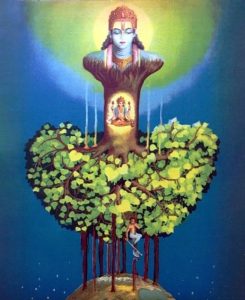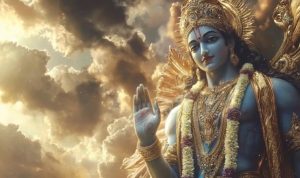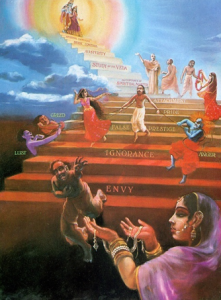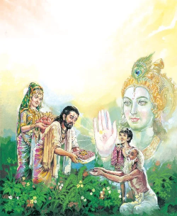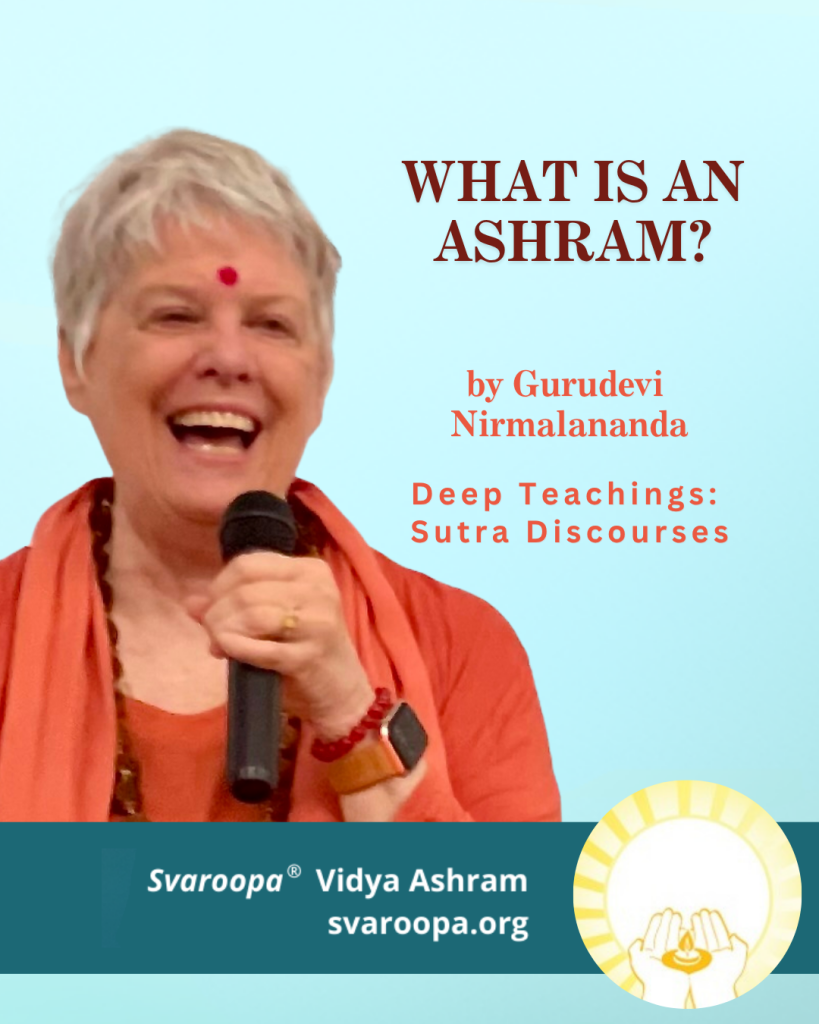By Nirooshitha Sethuram, Yogaratna
Graphics by Sheralee (Shambhavi) Hancherow
After hearing the divine words of Krishna, preserved for us in the Bhagavadgita, Arjuna’s delusion was destroyed. He regained his clarity and resolve through Krishna’s grace.
Arjuna stood firm, free from doubt, and promised to act according to Krishna’s words. Krishna returned their chariot to their position in the Pandava army.
The battle was set to commence, with both armies positioned and fully equipped. They were clad in polished armor with their weapons drawn. Arjuna blew his conch shell, Devadatta, to declare war. All the warriors in the Pandava army blew their own conches, producing startling sounds.
Suddenly Yudhishthira, the eldest, the steadfast, righteous son of Pandu, removed his armor and laid down his weapons. He stepped down from his chariot and began walking, alone and unarmed towards the Kaurava army. He walked toward Grandsire Bhishma’s chariot.
Yudhishthira’s unexpected move puzzled his brothers, particularly Bhima, who worried he might surrender and end the war. Bewildered by this unexpected action of his eldest brother, Arjuna jumped down from his own chariot and hurried after him. The other Pandava brothers joined him. Krishna, who understood the actions of Yudhishthira, gave an encouraging smile. All of this caught the attention of the warriors from both sides.
Yudhishthira, without acknowledging any of the gazes fixed on him, walked straight to Grandsire Bhishma with folded hands. Approaching Bhishma, unarmed, is a great sign of respect. He felt it was only right to receive his permission and blessings before engaging in such a grave war.
He touched Grandsire Bhishma’s feet and said, “Dearest Grandsire, we have been forced to participate in this war against you. Without your blessings I cannot start the war. So, I have come to seek your permission, and I pray for your blessings to win this war.”
Bhishma blessed Yudhishthira wholeheartedly, feeling proud of his grandson fulfilling his duty by respecting his elders. He said, “Though I am fighting for the opposition, obeying my vow and fulfilling my duty, my heart is with you and your brothers. Uphold dharma and be victorious.”
From there Yudhishthira went directly to Guru Drona to receive his blessings, then to Kripacharya, Shalya and other elders for their blessings too. The other Pandava brothers, seeing Yudhishthira’s intention, followed his steps getting the blessings of the elders.
Observing these events, Yuyutsu, the son of Dhritarashtra by a maid, made the decision to change his allegiance. He approached Yudhishthira as he was heading to his chariot and asked to join the Pandava army, stating he would not support unrighteousness. Yudhishthira accepted his request.
Duryodhana, Yuyutsu’s half-brother, was enraged by his actions. Yudhishthira and the brothers happily returned to their chariots with all the blessings, and the war officially began.
First Day
Duryodhana, along with Dhushasana, led his Kaurava forces into battle. Bhima did the same from the Pandava side. The battlefield of Kurukshetra became a landscape of intense and frenzied combat with countless warriors fighting and falling.
Chariots overturned, elephants trumpeted in pain and the ground turned slick with blood, making it treacherous. The uproar was earth-shattering, with drums, conchs, pipes mixed with war cries as well as the cries of wounded and dying warriors.
On the first day Bhishma launched a fierce attack on Pandavas, causing a lot of death and devastation. Wherever his chariot went, death of the Pandava soldiers was guaranteed. This made the Pandava army tremble in fear.
Full of fury, young Abhimanyu, the son of Arjuna, attacked the Kaurava army. His valor was noticed by all. He tried his best to stop Bhishma. He was able to bring Bhishma’s chariot flag down but was not successful to bring him down.
Uttara, the son of Vrata, was battling with Shalya. After a fierce fight, Shalya shot a spear which pierced Uttara’s chest. He fell from his elephant and died. Shweta, the brother of Uttara, went with vengeance to attack Shalya. His prowess didn’t go unnoticed. Bhishma came to rescue Shalya and ended Shweta’s life with one blow.
These deaths brought down the spirit of the Pandava army. On the other hand, the Kauravas were pleased by the results of the war on the first day. Krishna consoled Yudhishthira saying that eventually, righteousness would be victorious.
Second Day
After the unpleasant experiences of the first day, the Pandava army positioned themselves in a bird formation. This formation was suggested by Krishna himself. King Drupada stood at the head with Yudhishthira at the back. Dhrishtadyumna and Bhima led the feathers.
Seeing the Pandavas in this battle formation, the Kauravas took a formation to defend themselves and to attack the Pandavas.
Grandsire Bhishma was able to enter Pandavas’s formation in no time, creating a rift in their strategy. He started slaughtering Pandava warriors in big numbers. Arjuna, with Krishna as his charioteer, intervened to stop Bhishma and protect the Pandava army. Arjuna started battling Bhishma with all his might. The combatants were equally matched. The fierce fight went for hours with no result, but Arjuna accomplished the task of saving the Pandava army that day.
In another part of the battlefield, Drona battled with Dhrishtadyumna, wounding him. Bhima rescued Dhrishtadyumna. Seeing this, the King of Kalinga came to fight Bhima. Bhima attacked him and his elephant army with fury. Bhishma came to rectify the situation, and started battling with Bhima. Satyaki and Abhimanyu came to the rescue of Bhima. They started attacking Bhishma together. Witnessing this, Duryodhana immediately sent reinforcements to help Bhishma. They circled Bhima and Abhimanyu. Arjuna came for their rescue right on time.
The unexpected entry of Arjuna made the Kaurava army stagger. Arjuna started killing the Kaurava army at will. Meantime, Satyaki killed Bhishma’s charioteer. Bhishma’s chariot was pulled away from the battlefield by his horses. Thus there was nobody to stop Arjuna. He started destroying the Kaurava army in massive numbers. The Kaurava army was confused and disturbed by this.
On the second day, Arjuna and Bhima caused a lot of damage to the Kauravas. Duryodhana was very disappointed and unhappy as Kaurava army suffered huge damages. Especially Kalinga’s army suffered heavy losses.
Third Day
Grandsire Bhishma vowed to compensate for the heavy losses on the second day. He formed the Kaurava army in an eagle formation. He placed the best warriors in the right places with himself as the head.
To challenge this, Dhrishtadyumna put the Pandava army in a halfmoon shape, with Bhima and Arjuna on both ends. The war started up on the third day.
The Kauravas went straight to attacking Arjuna, covering his chariot with arrows and other weapons. In no time, Arjuna saved himself by building a defense with his arrows.
Satyaki and Abhimanyu together fought against Shakuni and his army. Bhishma and Drona fought Yudhishthira and his army. Bhima and his demon son Ghatotkacha battled the army of Duryodhana.
Ghatotkacha was the son of Bhima from his demon wife Hidimbi. He was a mighty warrior, just like his father, gifted with immense physical strength, plus he also inherited his mother’s magical powers. Because of the promise Ghatotkacha had made to his father, when Bhima thought of him, he appeared on the battlefield at once. The son did a better job in destroying the enemies than the father.
Bhima’s arrow pierced Duryodhana’s armor with such force that it wounded him and he fell unconscious from the pain. He collapsed in his chariot. Duryodhana’s charioteer drove the chariot immediately out of the battlefield. This made the Kaurava soldiers think that Duryodhana was running away from the field. This confusion made Duryodhana’s soldiers scatter.
Bhishma arrived just in time. He took Duryodhana with him and made sure he got the treatment he needed. When Duryodhana became conscious, Bhishma had already moved him to a secured area.
Angry, Duryodhana, accused Bhishma of not really fighting from his heart, because he loves the Pandavas too much. He blamed Bhishma for abandoning him and his army by not really fighting the Pandavas. He wanted Grandsire Bhishma’s assurance that he would be loyal to the Kauravas.
Stung by the accusation, Bhishma reminded Duryodhana that he had already predicted the Kauravas’ defeat. And Bhishma reaffirmed his commitment to fight the Pandavas with all his strength.
After saying this, Bhishma returned to the battlefield with full fury and started destroying the Pandava army in multitudes. The death toll climbed enormously. Arjuna confronted Bhishma to restore order. The duel between Arjuna and Bhishma started up again and continued for a long time.
Krishna saw that Arjuna hesitated to fight his grandsire. Krishna couldn’t remain quiet when seeing Bhishma gaining an upper hand. Lifting the broken wheel of a chariot, Krishna ran towards Bhishma to attack him. Arjuna halted Krishna, reminding him of his promise not to take up arms during the war.
Krishna said that if Arjuna won’t fight wholeheartedly, he must break his vow in order to uphold righteousness. Upon hearing this, Arjuna assured Krishna of his full commitment to participate in the battle and respectfully accompanied Krishna back to the chariot.
After this, Arjuna battled intensely. Bhishma was pleased to see Arjuna give his best in battle. Combatants from each side regarded his actions with admiration for his exemplary bravery.
That day before the sunset, 16,000 chariot soldiers were wiped out by Arjuna. In this way, hostilities concluded. That evening, Arjuna’s acts of valor were widely discussed.
More to come…
- Arjuna & Krishna blow conch shells https://ca.pinterest.com/pin/169659110957506914/
- Grandsire Bhishma & Yudhishthira https://wisdomwise.in/2021/02/09/how-important-are-blessings-for-success/
- Kurukshetra Battlefield https://mymahabharatblog.wordpress.com/2018/05/25/chapter-28-kurukshetra-day-1-2/
- Pandava army’s bird formation https://www.reddit.com/r/mahabharata/comments/1ha5h8b/mahabharata_war_day_2_morning/
- The battle between King of Kalinga, Bhima, Bhishma, etc. https://vedicfeed.com/18-days-of-the-mahabharata-war-summary-of-the-war/
- Krishna & Arjuna https://en.rattibha.com/thread/1869192730678882618
- Ghatotkacha https://dharmayana.in/articles/ghatotkacha-s-sacrifice-in-the-mahabharata-war-5963cc20-e2cd-4346-bc62-d263d7099c96
- Arjuna, Krishna & Bhishma https://commons.wikimedia.org/wiki/File:Arjuna_fight_Bhishma.jpg
- Arjuna, Krishna & Bhishma https://pankajsrivastava-78853.medium.com/sri-krishna-breaking-vow-10a75aa59d7d
